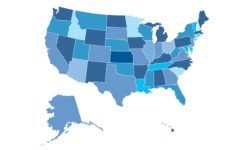Free Speech Lawsuits Being Used by Activists to Access Campuses
SOUTH LAKE TAHOE, Calif. – Most activist groups that demonstrate at colleges do so in ways that respect the permit process and the law enforcement agencies responsible for enforcing campus free speech policies. But according to Kristine Mollenkopf of Hardin & Coffin LLP, some organizations deliberately flout the rules to promote their political agendas through the courts.
Mollenkopf represents colleges sued by activists demanding the right to free speech, and in April during the annual meeting of the California College and University Police Chiefs Association (CCUPCA), she taught university officials how to handle these types of activists.
Some Protesters Come Looking for a Fight
According to Mollenkopf, a few groups come to campus for the sole purpose of changing the laws to give them greater access to colleges and universities. Their strategy: Get their members arrested and bring the colleges to court. One such case from Santa Barbara City College landed on Mollenkopf’s desk not long ago. The group called themselves the Survivors of the Abortion Holocaust, and they were suing for freedom of speech violations.
A little research revealed that this wasn’t their first time suing institutions of higher education. The group had visited several other campuses before targeting Santa Barbara and filed lawsuits against multiple administrations. Sometimes they appeared under the name Ministers to the Unborn.
According to Mollenkopf, the Survivors make a point of arriving on days when colleges have scheduled women’s issues events. They bring a video camera to use as evidence in the courtroom and take photographs of police enforcement for their Web site. “There are activist groups out there who are potentially more knowledgeable about their rights on your campus than you and your security staff may be,” Mollenkopf warned at the CCUPCA meeting. “They are trained, and they are mobilized.”
Know What to Expect in the Courtroom
The smart activist groups do their homework. They come to court knowing which violations to prosecute and what they will gain if they succeed.
One of the most common causes of action is 42 USC 1983. This statute gives activists the right to trial in a federal court if the offender acted under color of state law, and if the offender deprived them of a constitutional right. “They don’t want to be in your local county court, where your jurors all love your local community college or your local U.C. [University of California],” said Mollenkopf. “They want to be down in L.A. or up in San Francisco or wherever, where the vast majority of the potential jury pool is not going to have any real connection with that community college or institution.”
In California, activists are also partial to Civil Codes 51.7 and 52.1, colloquially termed the Ralph and Bane Acts, respectively. They typically use these acts to claim that by threatening to arrest them, campus law enforcement is threatening violence. The Ralph Act also comes in handy if they want to accuse the college of discrimination. If they succeed with their claims, the plaintiffs can collect at least $1,000 in statutory penalties. They could also receive up to three times their out-of-pocket expenses, which under the Ralph Act can go as high as $25,000. The administrators are also subject to injunctive relief.
Immunity Provides Some Protection
Despite these challenges, a few laws work in favor of the defense. Immunity is one of the best weapons an institution can have against litigious activist groups. Mollenkopf says that under qualified immunity, a federal employee can only be held liable for violating constitutional rights that a reasonable person would have known. If a third-party bystander viewing the situation objectively would approve of the behavior, the defendant is off the hook.
Discretionary immunity falls under state law. Unlike qualified immunity, discretionary immunity looks at the situation subjectively: Was the defendant acting without malice and with a reasonable belief that the college’s orders were fair? The subjective standard gives this immunity much broader applications, and is one more reason for defendants to avoid being brought to federal court under 42 USC 1983.
Train Your Security Staff to Handle a Crisis
Activists can be determined and creative. They can take two identical situations and mold them to create two different lawsuits. But well-informed and well-trained staff can ensure the college remains safe for peaceful dialogue.
According to Mollenkopf, an unprepared security force plays right into the hands of activists looking for lawsuits. Knowing how to behave when they come to call can spare the institution a massive legal headache.
When a peaceful protest turns disruptive:
- Understand your campus policy regarding free expression: These include the requirements of any time, place and man-ner regulations.
- Remain calm: Footage of officers losing their cool never helps the defendants.
- Ask questions: Are you a student? Why did you choose today to come here? Do you have a permit? If not, offer a permit application or suggest alternative means of expression. Besides providing an immedi-ate assessment of the situation, the infor-mation can also come in handy in the event of a lawsuit.
- Make sure security staff understand what they are and are not authorized to do: If they don’t, it’s quite possible the activists will.
- Never engage in a topical discussion: When a speaker attempts to draw in officers into a conversation, they should politely decline. “As soon as you talk about the issue, that communicates to them they’re getting kicked off this campus because you didn’t like what they had to say,” says Mollenkopf.
- Offer alternatives for expression: Let protestors know about other sites on or near campus where a permit is not required, or offer the speaker a permit application. If he or she refuses to stop or declines the reasonable alternatives being offered, state clearly the basis of the violation.
- Know the applicable laws: For example, California Education Code 76120 requires colleges and universities have reasonable “time, place, and manner” regulations for student free speech activities. Educational institutions must provide outlets for students to express themselves safely. For community colleges, this includes creating a free speech area.However, 76120 applies only to students. Off-campus activists don’t have the same rights on a college campus as the people sitting in the classrooms. In the 1981 case Widmar v. Vincent, the Supreme Court ruled that universities are not public forums and do not have to provide equal access to students and nonstudents. Penal Code 626.4 allows chief administra-tive officers or anyone they designate to withdraw permission to remain on campus if a group becomes disruptive.
By Kristen Minogue
If you appreciated this article and want to receive more valuable industry content like this, click here to sign up for our FREE digital newsletters!
 Leading in Turbulent Times: Effective Campus Public Safety Leadership for the 21st Century
Leading in Turbulent Times: Effective Campus Public Safety Leadership for the 21st Century
This new webcast will discuss how campus public safety leaders can effectively incorporate Clery Act, Title IX, customer service, “helicopter” parents, emergency notification, town-gown relationships, brand management, Greek Life, student recruitment, faculty, and more into their roles and develop the necessary skills to successfully lead their departments. Register today to attend this free webcast!







